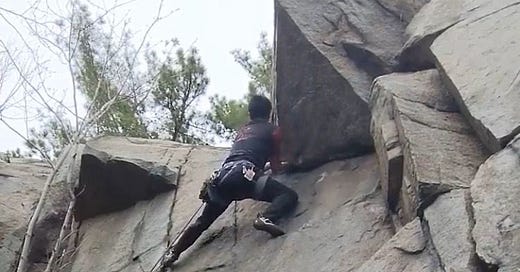🤯Unknown Unknowns #49 - Beta
Thank you for the replies on uncertainty from last week, I always enjoy hearing back from my subscribers. There will also be another free webinar on starting a newsletter. This one will be on Leveraging Your Newsletter. The course, Newsletter Launchpad, is open for registration. It runs from May 9th until June 2. Mondays and Thursdays at 8:30 PM ET. No class on Memorial Day.
I was up in Boston last weekend, visiting my brother. Since the weather was great, we went climbing at Rattlesnake Rocks. Climbing outside has much more uncertainty than climbing inside.
Inside, the holds are clear, every route is a different color. You know exactly where you can go.
Outside, you can use whatever you can grab hold of, but since the rocks are all the same color, it can be hard to tell what holds are good or even where they are. You can stare at a foothold without realizing it's a foothold. Until you figure out which holds to use, it’s quite difficult to climb all the way up. Adding to the difficulty, determining your route is mostly done by feel - planning the route out from the ground is usually counterproductive.
Information on the holds and a usable sequence of moves is called "beta". Outside, the beta is harder to see than inside. But by watching someone else you can see the beta.
Discoveries:
After I got back from climbing, I was thinking the beta in outdoor climbing is a metaphor for unknown unknowns. If you don't have the beta, climbing is an unknown unknown. Route diagrams are sketchy, you’re never quite sure if you’re even doing the route you think you’re doing.
The challenge is to figure out the beta while clinging to the rock. Much of life is trying to figuring things out while desperately holding on. Climbing outside made me think of how people explore unknown unknowns in the real world.
#
In 1929, a pediatrician wanted to see what babies would eat if they could eat anything they wanted. She let them eat whatever they wanted, as much as they wanted. The result? A doctor noted: “I saw them on a number of occasions and they were the finest group of specimens from the physical and behaviour standpoint that I have even seen in children of that age.”
The babies actually ate foods that corrected nutritional deficiencies.


##
Ben Patrick had terrible knees but existing exercise programs weren’t helping him. The existing programs were based on the common knowledge that having your knees go over your toes when you squat would hurt your knees. But Ben saw that children squat with their knees over their toes with no problems.
Ben built a workout program that focused on motions putting knees over toes and it not only fixed all his knee problems but improved his performance. His vertical increased by fifteen inches.
He says that his approach wasn't backed by scientific studies because scientists didn't know they should try these experiments. Now that he broke this ground, they are conducting the experiments and his theories are being proven. Scientific experimentation can only follow theory.
=> Article Here
=> Knees Over Toes Instagram
###
This is a really interesting essay that I'm going to have a hard time summarizing.
Normally, or originally, sudoku puzzles were created by trial and error. Each row, column, and box had to contain each digit, 1-9. Techniques were found to solve these puzzles.
But then someone discovered new principles of sudoku through math proofs. These principles not only made it easier to solve sudoku puzzles, but you could use these principles to create puzzles that were impossible to solve without knowing the principles! But if you know the principle, it’s simple to solve. I’m not sure why, but I find it fascinating. It’s like a whole different game played with the same rules. And I recommend reading the article - it has diagrams that make the concept a whole lot easier to understand.
=> Article Here
Questions, suggestions, complaints? Email me me at [email protected]. Feedback welcome.
If you enjoyed this newsletter, please share it with a friend or two. And feel free to send anything you find interesting to me!
Leaving you in peace,
Chris





